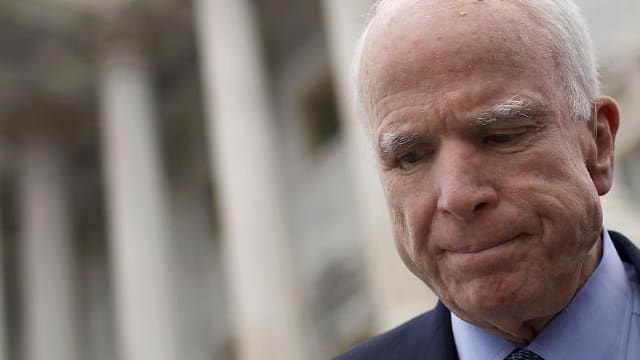
Senate Republicans find themselves boxed-in in the wake of President Donald Trump's renewed attacks on the late Sen. John McCain, unwilling to strongly stand up to a President who is widely popular with GOP base voters but still deeply uncomfortable with his criticism of the late war hero and, for many in the chamber, a friend.
That fine line Republicans are walking was on display this week when only a few of them weighed in on Trump's sustained assault on McCain and those who did speak out issued tepid statements that praised McCain's military and political service to the country but stopped short of criticizing Trump for his harsh rhetoric.
The clearest example of this came from Sen. Lindsey Graham, a South Carolina Republican, who is known as McCain's soul mate in the Senate but who is also up for re-election in 2020 and in need of Trump's continued political backing.
Speaking in a subdued voice, he told WLOS TV in Spartanburg Wednesday that he is not happy with Trump's attacks on McCain but that, "I'll try to continue to help the President."
"I think the President's comments about Sen. McCain hurt him more than they hurt the legacy of Sen. McCain," Graham said. "My job is to represent the people of South Carolina. They want me to work with the President where I can. I've gotten to know the President. We have a good working relationship. I like him. I don't like it when he says things about my friend John McCain."
Graham, a foreign policy hawk, is keenly aware that if he blows up his relationship with Trump by criticizing him too hard, he could lose the Oval Office access he currently enjoys. That special access has allowed Graham to appeal directly to Trump when the President moved to pull troops out of Syria or taken other steps the senator opposes.
Adding to the awkwardness for Republicans this week: Senate Minority Leader Chuck Schumer said he would offer legislation to rename the Russell Senate Office Building in honor of McCain, a move that could anger Trump if Republicans agreed to it.
Senate Majority Leader Mitch McConnell set the tone for his caucus in a tweet Wednesday -- several days after Trump suddenly started attacking McCain, who died in August.
"Today and every day I miss my good friend John McCain. It was a blessing to serve alongside a rare patriot and genuine American hero in the Senate. His memory continues to remind me every day that our nation is sustained by the sacrifices of heroes," the Kentucky Republican said.
Other key Republicans, especially those up for re-election, like Sen. Cory Gardner of Colorado and Sen. Thom Tillis of North Carolina didn't respond to repeated requests for comment.
Sen. Marth McSally, a Republican of Arizona, who was appointed to McCain's seat and will face voters next year to keep it, called McCain "an American hero" and said, "Everyone should give him and his family the respect, admiration, and peace they deserve." But her tweet did not mention Trump by name.
Speaking anonymously, an aide to a Republican senator up for re-election in 2020 explained the dilemma many GOP senators face. Should they weigh in and criticize Trump, something that could draw his wrath, or let the news cycle pass without their fingerprints? This senator decided to stay mum after determining it was not worth inflaming GOP voters at home.
GOP Sen. Rob Portman was with Trump Wednesday at a factory in Lima, Ohio where Trump again blasted the late Republican senator, this time for not thanking him for approving McCain's elaborate funeral.
Portman put out a statement saying he was "proud" to be with Trump but never mentioned McCain. Asked if the senator agreed with Trump, Portman spokeswomen Emily Benavides would only say that her boss "said afterward McCain is an American hero and missed in the Senate."
The only Republican to hit Trump hard was Sen. Johnny Isakson of Georgia who told an interviewer Trump's comments were "deplorable." But the veteran lawmaker declined to criticize Trump much beyond that, avoiding talking about Trump's mental stability or whether the President is a role model for children.